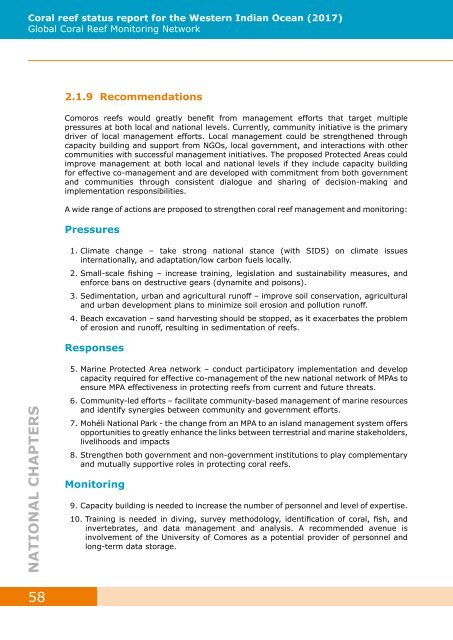GCRMN_COI_2017-Western Indian Ocean Reef Status
GCRMN Western Indian Ocean Coral Reef Status report for 2017. Produced by the Indian Ocean Commission and CORDIO East Africa
GCRMN Western Indian Ocean Coral Reef Status report for 2017. Produced by the Indian Ocean Commission and CORDIO East Africa
You also want an ePaper? Increase the reach of your titles
YUMPU automatically turns print PDFs into web optimized ePapers that Google loves.
Coral reef status report for the <strong>Western</strong> <strong>Indian</strong> <strong>Ocean</strong> (<strong>2017</strong>)<br />
Global Coral <strong>Reef</strong> Monitoring Network<br />
2.1.9 Recommendations<br />
Comoros reefs would greatly benefit from management efforts that target multiple<br />
pressures at both local and national levels. Currently, community initiative is the primary<br />
driver of local management efforts. Local management could be strengthened through<br />
capacity building and support from NGOs, local government, and interactions with other<br />
communities with successful management initiatives. The proposed Protected Areas could<br />
improve management at both local and national levels if they include capacity building<br />
for effective co-management and are developed with commitment from both government<br />
and communities through consistent dialogue and sharing of decision-making and<br />
implementation responsibilities.<br />
A wide range of actions are proposed to strengthen coral reef management and monitoring:<br />
Pressures<br />
1. Climate change – take strong national stance (with SIDS) on climate issues<br />
internationally, and adaptation/low carbon fuels locally.<br />
2. Small-scale fishing – increase training, legislation and sustainability measures, and<br />
enforce bans on destructive gears (dynamite and poisons).<br />
3. Sedimentation, urban and agricultural runoff – improve soil conservation, agricultural<br />
and urban development plans to minimize soil erosion and pollution runoff.<br />
4. Beach excavation – sand harvesting should be stopped, as it exacerbates the problem<br />
of erosion and runoff, resulting in sedimentation of reefs.<br />
Responses<br />
NATIONAL CHAPTERS<br />
5. Marine Protected Area network – conduct participatory implementation and develop<br />
capacity required for effective co-management of the new national network of MPAs to<br />
ensure MPA effectiveness in protecting reefs from current and future threats.<br />
6. Community-led efforts – facilitate community-based management of marine resources<br />
and identify synergies between community and government efforts.<br />
7. Mohéli National Park - the change from an MPA to an island management system offers<br />
opportunities to greatly enhance the links between terrestrial and marine stakeholders,<br />
livelihoods and impacts<br />
8. Strengthen both government and non-government institutions to play complementary<br />
and mutually supportive roles in protecting coral reefs.<br />
Monitoring<br />
9. Capacity building is needed to increase the number of personnel and level of expertise.<br />
10. Training is needed in diving, survey methodology, identification of coral, fish, and<br />
invertebrates, and data management and analysis. A recommended avenue is<br />
involvement of the University of Comores as a potential provider of personnel and<br />
long-term data storage.<br />
58


















